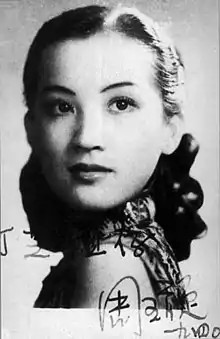When Will You Return?
"When Will You Return?" (Chinese: 何日君再來; pinyin: Hé Rì Jūn Zài Lái) is a Chinese song first sung by Zhou Xuan in 1937, but also well known as a song by Teresa Teng. It has also been variously translated as "When Will the Gentleman Come Back Again?" or "When Will You Come Back Again?" The lyrics were written by Huang Jiamo (黃嘉謨) set to a tune composed by Liu Xue'an.
| "When Will You Return?" | |
|---|---|
| Song by Zhou Xuan | |
| Language | Chinese |
| Released | 1937 |
| Composer(s) | Liu Xue'an (劉雪庵) |
| Lyricist(s) | Huang Jiamo (黃嘉謨) |

Background
Composition
According to Liu Xue'an's son, the tune was written by his father at an undergraduate party at the Shanghai Music Conservatory, during which an impromptu song-composition competition was suggested. Liu wrote the melody quickly, played it as a tango song and won the approval of other students.[1] The director Fang Peilin (d. 1949?) liked the tune, and asked Bei Lin (later identified as Huang Jiamo) to write the lyrics to be used for his new film.[2]
Controversy
The song was highly popular as well as controversial. The controversy arose due to the various interpretations and political readings of its supposed "hidden" meaning. The lyrics were interpreted as either anti-Japanese, treasonous, or pornographic. After 1949 the song was banned by the People's Republic of China because it was seen as bourgeois and decadent.[3][4] The writer Liu was criticized and suffered during the Anti-Rightist Movement in 1957 and during the Cultural Revolution in the 1960s. He offered a public self-criticism in 1980 before he was rehabilitated, but criticism of the song continued in mainland China for some time as an example of "Yellow Music", a product of decadent and immoral society.[3]
This song was also banned in Taiwan during the martial law period because the word jūn (君) "gentleman" (here used to address the person, therefore translated as "you") sounds the same as the word jūn (軍, meaning "army"), therefore censors feared that people may associate the song with People's Liberation Army.[5]
Zhou Xuan's original version
The song was originally sung by Zhou Xuan and first appeared as an accompaniment to the film Three Stars by the Moon (三星伴月), a 1937 film directed by Fang Peilin and produced by the Yihua film company. The film was one of the last silent movies made in China, and the only silent movie Zhou Xuan starred in. The songs in the film were probably played to the audience on a gramophone synchronized with the action.[6]
Teresa Teng's version
The song became heavily associated with Teresa Teng through her version, released in 1979,[7] so that she has supplanted Zhou Xuan as "the primary singer identified with this song".[8] In Mainland China too, Teng became prominent via the song. Geremie R. Barmé, author of In the Red: On Contemporary Chinese Culture, described the song as a "nostalgic ode". Barmé said that some individuals on the Mainland condemned the song, describing it as "traitorous" and "obscene".[9]
Memorials for Teng have included performances of "When Will You Return?"[10]
Other versions
Zhou's colleague, actress Li Lili performed the song in Cai Chusheng's film Orphan Island Paradise 孤島天堂 (1939).[11]
The song was translated into Japanese and sung by Hamako Watanabe (1940), and was re-released by Li Xianglan the following year; Li (aka Yamaguchi Yoshiko) was fluent in both Chinese and Japanese, and also performed Chinese versions.[12]
The song has been recorded by Judy Ongg,[13] Fei Yu-ching, Lisa Ono, Claire Kuo and many others.
Mitsuki Takahata sang it as the title track to the film Itsu mata kimi to (2017).[13]
A rendition entitled “Waiting for Your Return” by Jasmine Chen played during the opening credit of the film Crazy Rich Asians (2018).[14]
References
- Citations
- Steen (2000), p. 139, citing Zhu Tianwei (1990), p. 231
- Steen (2000), p. 139, citing Zhu Tianwei (1990), pp. 230–231
- Steen (2000), pp. 124–153.
- Jones. Andrew F. (2001). Yellow Music - CL: Media Culture and Colonial Modernity in the Chinese Jazz Age. Duke University Press. pp. 151. ISBN 0-8223-2694-9.
- "EastSouthWestNorth: Tales From The Martial Law Era". Zonaeuropa.com. Retrieved 2012-03-14.
- Steen (2000), p. 129–130.
- Tan, Jason (10 April 2007). "Who is Teresa Teng?". Radio Singapore International. Archived from the original on 2007-11-17. Retrieved 23 May 2012.
- Steen (2000), p. 146.
- Barmé, Geremie R. (1999), In the Red: On Contemporary Chinese Culture, Columbia University Press, p. 125, ISBN 9780231106146
- "Shanghai embraces fresh Chage & Aska". china.org.cn. Retrieved 2012-03-14.
- Steen (2000), pp. 126. 134.
- Steen (2000), p. 135.
- "Takahata Mitsuki, Shōwa kayō no meikyoku wo kabā: Mukai Osamu no hanseiki 'Itsu mata kimi to' shudaika" 高畑充希、昭和歌謡の名曲をカバー 向井理祖母の半生記『いつまた、君と』主題歌 [Mitsuki Takahata covers classic song from Shōwa period: title track of Its mata kimi to, a biography of Osamu Mukai's grandmother]. Oricon News. 2017-03-09.
- Witzleben, J. Lawrence (15 July 2019), "Transnationalism and Transformation in the Songs of"Crazy Rich Asians"" (PDF), Abstracts for the 45th ICTM World Conference, p. 209
- Bibliography
- Steen, Andreas (2000). "Tradition, Politics and Meaning in 20th Century China's Popular Music: Zhou Xuan — When Will the Gentleman Come Back Again" (PDF). CHIME Journal (14–15): 124–53. Archived from the original (PDF) on 2013-05-02.CS1 maint: ref=harv (link)
- Zhu Tianwei 朱天纬 (1990). "Guanyu 'Heri jun zailai' de qianqian houhou 关于〈何日君再来〉的前前后后 [Everything about "When will the gentlemen come back again?]". Zhou Xuan gequ 100 shou 周璇歌曲100首 [Zhou Xuan: 100 songs] (in Chinese). Taiyuan: Shanxi jiaoyu chubanshe.